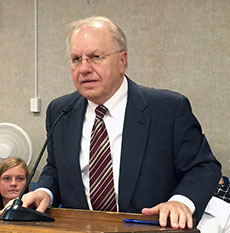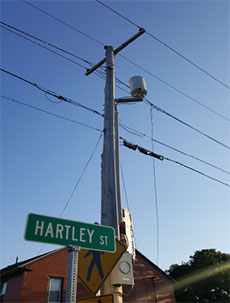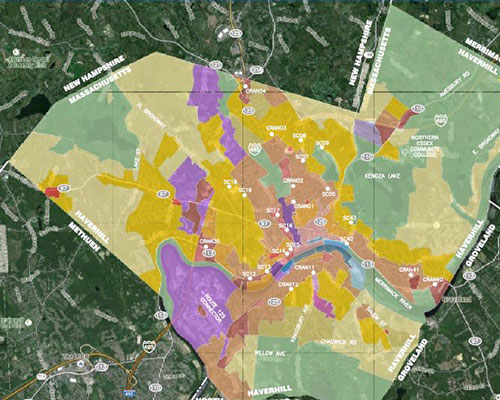White dots on the map show locations of Verizon’s 23 “small cell” installations—each wired to a fiber network.

Haverhill City Council President John A. Michitson.
High-speed broadband internet competition is coming to Haverhill, but not in the conventional way.
Verizon Wireless will be installing 23 “small cells” atop telephone poles in various city neighborhoods during October and November, City Council President John A. Michitson told his colleagues Tuesday night. Rather than wiring the city, the system uses 4G LTE cellular telephone technology.
“The small cell technology does offer, you know, a much lower cost than actually dragging fiber to every household,” Michitson said. He acknowledged there is no hope Verizon will bring its Fios fiber optic system to Haverhill because it is too expensive to run cables throughout the city’s expansive 34.5 square miles.

Haverhill City Councilor William J. Macek.
Michitson opened his presentation by broadband competition in nearby communities has driven down residential and business costs. As an example, he cited, Methuen’s Fios customers pay $90 per month for services similar to Haverhill’s Comcast Triple Play service which costs $50 more. The concept of lowering costs through competition resonated with Councilor William J. Macek
“The one thing you can be sure if you have Comcast, your bill is going to go up twice a year,” Macek said. In many cases, Comcast’s monthly fees are more than a car payment, he added,
Councilors unanimously backed Michitson’s proposal to name a “Broadband and Network Access Task Force” to explore other high-speed internet opportunities. Creating a city-owned network would be among the options to be considered, he said. However, noting Cambridge just spent $200,000 just in consulting fees, Michitson said he doesn’t recommend a municipal network yet. Mayor James J. Fiorentini, who was present, said he would name a committee and include Michitson as a member.

An example of a Verizon small cell installation on a utility pole. (Courtesy photograph.)
Verizon has already secured approval from the city’s Zoning Board of Appeals and received building permits to place the 23 small cells. Initial coverage centers on the city’s core and two installations in the Riverside neighborhood.
The telephone company will connect each cell to its network using “dark fiber.” It explained its rationale in a fact sheet.
“Verizon Wireless proposes to place small cells in area where its network is currently affected by heavy call volume and growing demands. Currently, this activity is focused on cities and towns throughout the area.


I see about 4 sites for Bradford. Not sure what map you see on this article
I see per usual…Haverhill 23, Bradford 0
I would like to ask the person who wrote this article to produce any evidence that this implementation is in anyway high speed internet competition. For it to be competition it would need to have unlimited service and speeds in excess of 150 mbps. Verizon Wireless is putting systems like this in all over the country. So, to the author of this article, please show me a rate plan sheet with the speeds offered and the pricing and we shall see if it is indeed any competition. I hope it is but fear that it is not.
What does Haverhill’s 35 square miles have to do with anything regarding Fios? Andover is a couple square miles smaller and they have Fios. There are likely bigger communities with it. This network they are putting in in Haverhill seems to be an enhancement for their mobile LTE network, not a competitor to Comcast. Does anyone have any evidence to the contrary?
“The one thing you can be sure if you have Comcast, your bill is going to go up twice a year,” Macek said.
My bill has been going down every year while at the same time increasing the services I receive. Comcast is losing tens of thousands of customers every month as a result of streaming services like Roku, Amazon Fire, and others. All you have to do is call them and threaten to cancel and they’ll offer all kinds of cost reductions to keep you as a customer.
Like one in my area. Londonderry Nh. Locked in to Comcast and they stink.